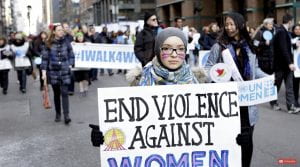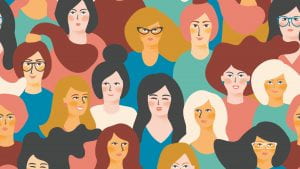We are one day closer to completing this semester and I absolutely cannot wait. While I have enjoyed my classes thoroughly, this online stuff is not for me. But another day, another blog.
This week I want to talk on the topic of Activism. Activism, as we know, is “policy or action using campaigning to bring about some change.” An example of a type of campaign would first be The Chipko Movement. This movement looked to prevent tearing down of trees in forests. This movement was successful and spread to other parts of the country. What I found that was interesting is that women were the ones in the movement hugging the trees to prevent them from being taken down. I made the connection to the Norgaard and York study in which they said women were the ones expressing the concern for the environment and were more likely to take action if given a stance in environmental policy.
Now that I have talked about activism, I want to talk about the oppression of women and nature. In a few previous blogs, I mentioned women in the Global South experiencing oppression from environmental degradation. In the article Speak Truth to Power, the first sentence states “throughout Africa women hold primary responsibility for tilling the fields, deciding what to plant, nurturing the crops, and harvesting the food” (Maathai 1). Maathai is an activist for women’s rights as well as an environmentalist. Maathai starts this article by showing how women hold high levels of responsibility when it comes to caring and providing for the family. When you look up oppression, oppression is not just unjust or cruel treatment, it is also mental pressure as well as distress. The amount of pressure and distress felt by women to care for their families and hope nothing goes wrong along the way is unreal. Not only in Africa but in countries all over the world. Another example of the oppression of women is noted in Maathai’s article when she speaks about a forester laughing at women wanting to plant trees and not believing that they could accomplish such a task. Towards the end of the article, Maathai mentions how women tried to declare a “freedom corner” in a park that they did not want to be taken away from the people. They were arrested, beaten. Though they did not give up, they were still pressed to leave by authorities. This clearly shows the oppression of women and Maathai makes that clear when she says, “you know, when they attack me, I say this is violence against women” (Maathai 32).
Women are fighters, especially when it comes to environmental degradation and caring for themselves and their loved ones. Through all of the oppression and hate that they experience daily, they never give up and this is shown in the article by Maathai.
Another article written by Ivone Gebara talks about ecofeminism from the views of Latin Americans. She starts by mentioning how hard it is to be a feminist in this society because it is a patriarchal society. This feeds into the oppression of women and is what some ecofeminists work to rid society of. Gebara states that while we are “discussing theories,” different acts of environmental degradation are occurring. Trees are being taken down; rivers are polluted. She speaks of daily life for marginalized and poor women and discusses how life for them is like a prison when faced with the problems they are faced with regarding caring for their families and they don’t have time to formulate a concrete solution to the problems most ecofeminists are trying to target. In a society where all are viewed as equal, nature included, I believe we could see improvement for all. In making women the weak and the responsible, no one is able to focus on problems such as environmental degradation.



I really enjoyed this week’s readings on activism. It definitely gives me hope for the future reading about the positive impacts women have made by standing up for not only themselves, but their cultures, and the environment. It was also very inspiring to read about the success many of these women activists have had. Even though many of the women activists faced horrific treatment from the patriarchal system we live in, this did not deter them from trying to make a difference. The first example you used of the Chipko movement, even though it was a short reading, gave a lot of interesting information. The fact these women literally came together and surrounded the trees in order to prevent them from not being torn down is an amazing form of activism and teamwork. The success that came from this movement shows how powerful women can be if they come together and take action. From these readings I learned that most of the time verbal actions are not enough to make a difference. Out of all the readings I found Maathai’s story the most captivating. She brought up many points that we have read about before in this class that you brought up. Such as the fact that since women are the primary caregivers of their households they are known to care more about nature as well because the environment provides them with many resources they need to thrive in life. This reading particularly shows all kinds of oppression against women as well as nature. I agree women can also feel a lot of pressure mentally in regards to having the sole responsibility for providing for themselves and their families. Especially in areas where environmental degradation is increasing, I can only imagine the strain it puts on some women to provide sufficient amounts of food and water for their loved ones. I thought it was very true and unfortunate when Gebara mentioned that society for marginalized women is like a prison. These women feel trapped from the pressures of society coming from all directions.
Hi Ashton! First off, I completely agree and I could not be more excited to finish this semester too! This pandemic has really messed up a lot of stuff and I am finding it hard to get all of my deadlines completed on time. Also, I really liked reading your post this week and wanted to talk about a few things I found interesting. First, I really liked how you included a definition of the word activism and what it means and gave an example of it. When you said, “When you look up oppression, oppression is not just unjust or cruel treatment, it is also mental pressure as well as distress. The amount of pressure and distress felt by women to care for their families and hope nothing goes wrong along the way is unreal.” I related oppression back to my post where I talked about Sam Levins’s article called “At Standing Rock, women lead the fight in face of Mace, arrests and strip searches”. In this article, the author explains a situation where native women were protecting their land and their basic human rights to clean water and food and were being arrested and treated like criminals by policemen who were abusing them and raping them. Women all over the world are oppressed every day and it is awful to think about. Lastly, I wanted to talk about this quote you mentioned that I really liked, “Women are fighters, especially when it comes to environmental degradation and caring for themselves and their loved ones. Through all of the oppression and hate that they experience daily, they never give up.” This sentence seems like a very good conclusion to your overall blog post and I agree that women are fighters for the environment as well as their family. Overall, great post this week!